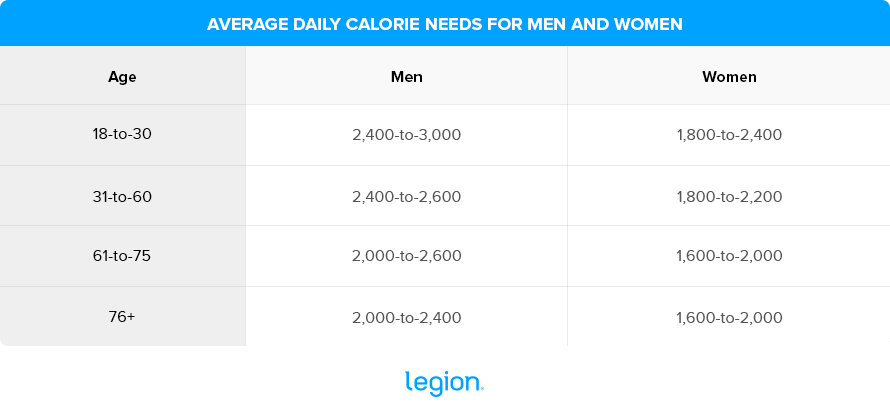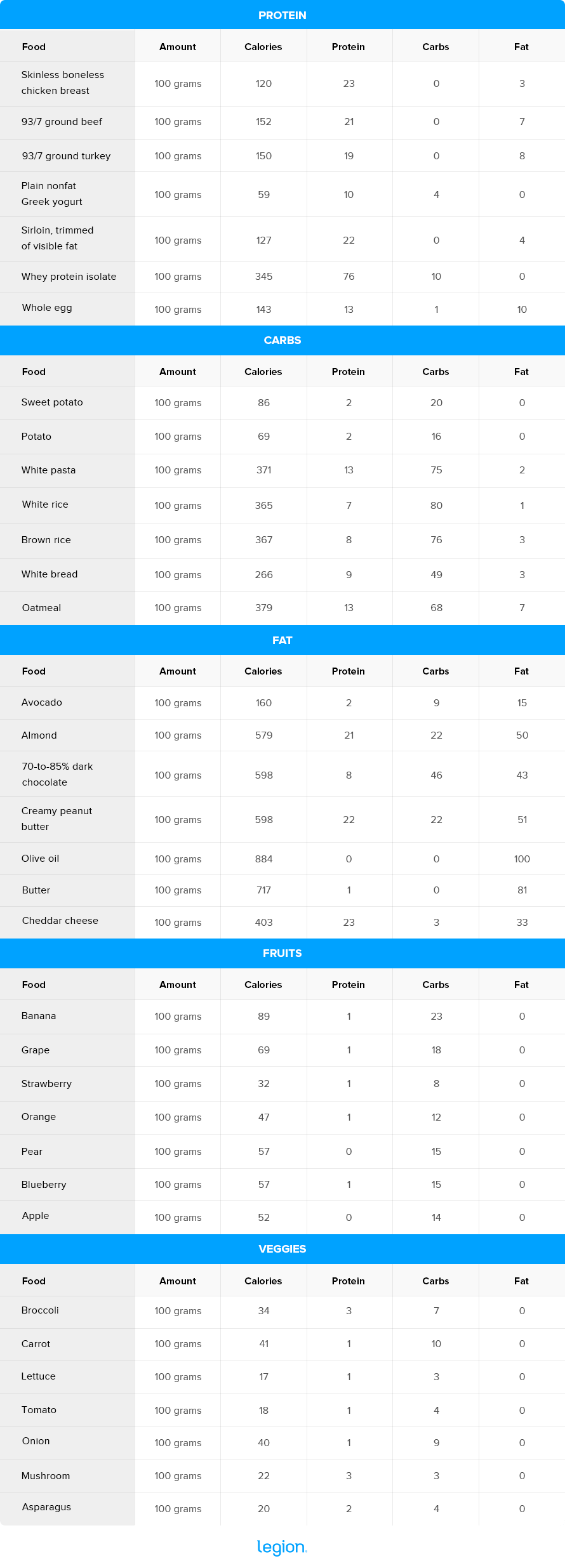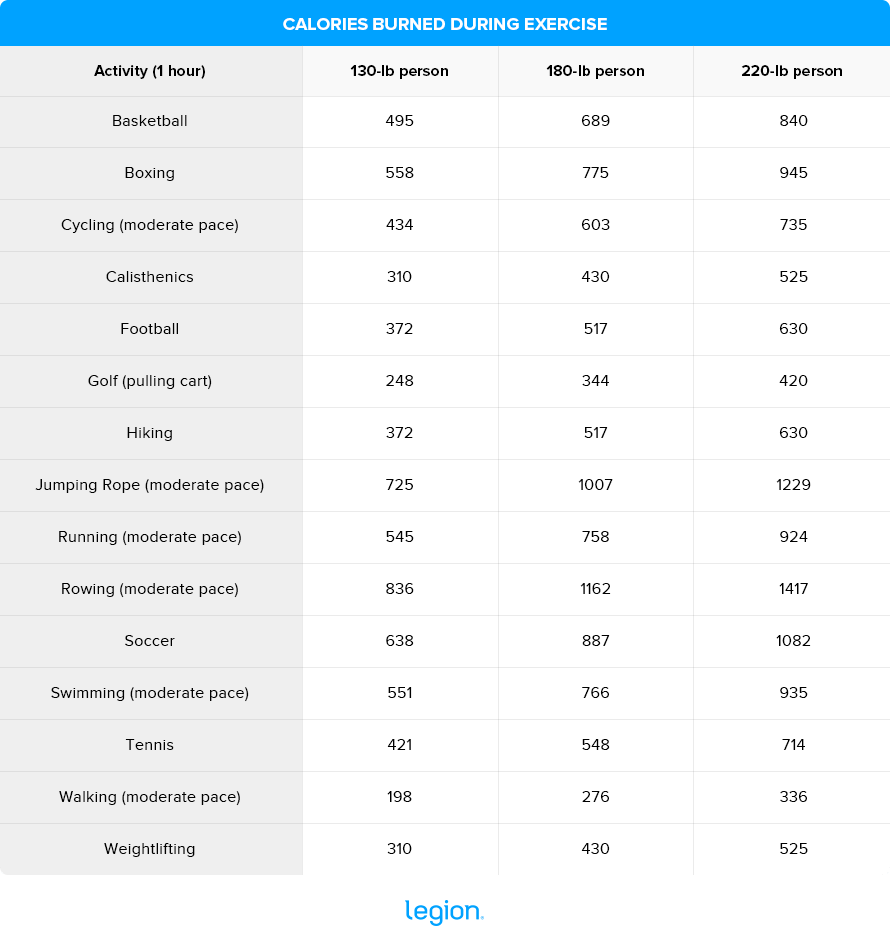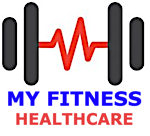Evidence Based
Enter your details into the calorie calculator below to learn how many calories you should eat to reach your health and fitness goal.
The calculator defaults to the Mifflin-St Jeor equation, a highly accurate method of calculating caloric needs.
If you’d rather crunch the numbers manually, use the Mifflin-St Jeor equation outlined below to determine your basal metabolic rate (BMR)—the average daily calories your body needs to carry out essential functions such as breathing, circulating blood, producing hormones, and so forth.
For men: BMR = 10 x weight (kg) + 6.25 x height (cm) – 5 x age (years) + 5
For women: BMR = 10 x weight (kg) + 6.25 x height (cm) – 5 age (years) – 161
To convert your BMR into your total daily energy expenditure (the total number of calories your body burns each day, also called your “TDEE”), multiply your BMR by the corresponding number below, according to your level of physical activity:
- Sedentary: 1.2
- Lightly Active: 1.375
- Moderately Active: 1.550
- Very Active: 1.725
- Extra Active: 1.9
Finally, adjust the number you get based on your goals.
To lose weight, trim your calorie intake by 20-to-25%.
For example, if your TDEE is 2,000 calories, and you want to lose weight quickly, reduce 2,000 by 25% to arrive at a daily calorie target of 1,500 calories.
Conversely, to gain weight, increase your calories by 5-to-10%.
For example, if your TDEE is 2,000 calories, and you want to gain weight quickly, increase 2,000 by 10% to arrive at a daily calorie target of 2,200 calories.
How Many Calories Should I Eat?
Your calorie needs depend on your sex, age, height, weight, and physical activity level.
For instance, a tall, young, muscular, active man will require more calories than a petite, overweight, older woman who engages in sporadic light activity.
According to the U.S. Department of Agriculture’s (USDA’s) 2020–2025 Dietary Guidelines, the average daily caloric needs for men and women are as follows:

While these estimates serve as a starting point, you’ll want to track your calorie intake more closely for effective weight loss, gain, or maintenance.
Here’s what you need to do.
How to Use A Calorie Calculator to Lose Weight
To lose weight, you need to eat fewer calories than your body burns every day (also known as a “calorie deficit”).
To do this, use the Legion Calorie Deficit Calculator to estimate your total daily energy expenditure (TDEE), based on your gender, weight, height, age, and physical activity level.
Then, create a calorie deficit by consuming 20-to-25% fewer calories daily (20-to-25% less than your TDEE) or following our suggestions for slow, moderate, and fast fat loss in the “Calories to lose weight” section beneath the calculator.
To accelerate fat loss and maximize muscle retention while dieting, you should also do the following:
- Do 3-to-5 strength training workouts weekly: This boosts the number of calories you burn and supports muscle retention, which is key to maintaining metabolic health and keeping weight off post-diet.
- Eat 1-to-1.2 grams of protein per pound of body weight per day: This enhances workout recovery, accelerates fat loss, bolsters muscle retention, and increases satiety, reducing the likelihood of overeating.
How to Use A Calorie Calculator to Gain Weight
Counting calories isn’t only for weight loss—it’s also a powerful tool for gaining weight and muscle.
Rather than mindlessly consuming a fixed number of calories, like 3,000 or 3,500 calories per day, a smarter strategy to ensure most of the weight you gain is muscle is to use the Legion Calorie Calculator to determine your TDEE.
Once you’ve established this figure, consume 5-to-10% more calories than your daily expenditure or follow the guidelines for slow, moderate, and fast weight gain in the “Calories to gain weight” section beneath the calculator.
How to Use A Calorie Calculator to Maintain Weight
The Legion Calculator also doubles as a maintenance calorie calculator. That is, you can use it to calculate how many calories you should eat per day to maintain your weight.
To use it for this purpose, enter your data to calculate your TDEE, then use this as your daily calorie target.
What to Eat to Reach Your Goal Weight
As I explain in my fitness books for men and women, Bigger Leaner Stronger and Thinner Leaner Stronger, irrespective of your goal, you should look to get most of your daily calories from whole, minimally processed food.
Here are some good examples of food to include in your diet:
- Protein: Meat, fish, eggs, high-protein dairy products, soy, and whey, casein, and plant-based protein powders.
- Carbohydrates: Fruits, vegetables, whole grains (brown rice, corn, oats, quinoa, barley), legumes (beans and peas), and tubers (potatoes and other root vegetables).
- Fat: Plant oils, nuts, seeds, and avocados.
Calories in Common Diet Foods
Now that you know the types of foods you should aim to eat while dieting, it’s helpful to understand their calorie contents.
Here’s the calorie content of some common diet staples and how many grams of protein, carbs, and fat each contains:

Calories Burned During Exercise
Here’s the average number of calories you burn doing common exercises based on your body weight.

+ Scientific References
- Phillips, Stuart M., and Luc J.C. Van Loon. “Dietary Protein for Athletes: From Requirements to Optimum Adaptation.” Journal of Sports Sciences, vol. 29, no. sup1, Jan. 2011, pp. S29–S38, www.tandfonline.com/doi/full/10.1080/02640414.2011.619204, https://doi.org/10.1080/02640414.2011.619204.
- Evans, Ellen M, et al. “Effects of Protein Intake and Gender on Body Composition Changes: A Randomized Clinical Weight Loss Trial.” Nutrition & Metabolism, vol. 9, no. 22691622, 12 June 2012, p. 55, www.ncbi.nlm.nih.gov/pmc/articles/PMC3407769/, https://doi.org/10.1186/1743-7075-9-55. Accessed 6 Oct. 2020.
- Helms, Eric R, et al. “Evidence-Based Recommendations for Natural Bodybuilding Contest Preparation: Nutrition and Supplementation.” Journal of the International Society of Sports Nutrition, vol. 11, no. 1, 12 May 2014, www.ncbi.nlm.nih.gov/pmc/articles/PMC4033492/, https://doi.org/10.1186/1550-2783-11-20.
- Halton, Thomas L., and Frank B. Hu. “The Effects of High Protein Diets on Thermogenesis, Satiety and Weight Loss: A Critical Review.” Journal of the American College of Nutrition, vol. 23, no. 5, Oct. 2004, pp. 373–385, https://doi.org/10.1080/07315724.2004.10719381.
- Jetté, M, et al. “Metabolic Equivalents (METS) in Exercise Testing, Exercise Prescription, and Evaluation of Functional Capacity.” Clinical Cardiology, vol. 13, no. 8, 1990, pp. 555–65, www.ncbi.nlm.nih.gov/pubmed/2204507/, https://doi.org/10.1002/clc.4960130809.
You May Also Like
Our Most Popular Evidence-Based Articles
You don’t need supplements to build muscle, lose fat, and get healthy. But the right ones can help.
Take our 60-second quiz now to learn which supplements can help you achieve your fitness goals faster.
Sending…
Your free stuff is on the way!
Follow the Diet Plan that Helped Nikita Lose 15 Pounds in 3 Months
“I never thought getting in shape would be this simple! Everything just WORKS when you follow this plan.” And if he can do it, why not you?

Wait!
Want a Free Custom Meal Planning Tool?
Quickly calculate your calories, macros, and micros for losing fat, building muscle, and staying healthy.
Our “No Return Necessary”
Money-Back Guarantee
If you don’t like something of ours, guess what happens next?
No, we don’t request you deliver it to a PO box in the Gobi Desert by carrier pigeon. Nor do we ask you to fill a cursed inkwell with orc’s blood and demon saliva and then use it to complete reams of return forms written in ancient Cyrillic script.
We just . . . wait for it . . . give you your money back. Holy moo cows. And that means you can say “yes” now and decide later.
Free Worldwide Shipping & Returns
Many companies use shipping and handling fees to increase their profit margins, but here at Legion, we hate profits, so our shipping is free!
Okay, so we do dig on profits, but we also go in for happy customers, and free shipping works like gangbusters. So, if you live in the United States, your order ships free regardless of order size, if you live in the UK or Canada, your order ships free when it’s over $99, and if you live elsewhere, your order ships free when it’s over $199.
Also, if you don’t absolutely love our stuff for whatever reason, we don’t request you deliver it to a PO box in the Gobi Desert by carrier pigeon.
We just . . . wait for it . . . give you your money back. No returns. No forms. No nonsense. Holy moo cows.
That means you can say “yes” now and decide later. You really have nothing to lose.
Free Worldwide Shipping & Returns
Many companies use shipping and handling fees to increase their profit margins, but here at Legion, we hate profits, so our shipping is free!
Okay, so we do dig on profits, but we also go in for happy customers, and free shipping works like gangbusters. So, if you live in the UK or Canada, your order ships free when it’s over $99.
Why the restriction on international orders? Unfortunately, shipping abroad is very expensive, and if we didn’t require a minimum order size, we’d lose a lot of money. But! We’re also hustling to improve our international logistics and will be passing our savings along to our international customers.
Also, if you don’t absolutely love our stuff for whatever reason, we don’t request you deliver it to a PO box in the Gobi Desert by carrier pigeon.
We just . . . wait for it . . . give you your money back. No returns. No forms. No nonsense. Holy moo cows.
That means you can say “yes” now and decide later. You really have nothing to lose.
Free Worldwide Shipping & Returns
Many companies use shipping and handling fees to increase their profit margins, but here at Legion, we hate profits, so our shipping is free!
Okay, so we do dig on profits, but we also go in for happy customers, and free shipping works like gangbusters. So, if you’re outside the USA, your order ships free when it’s over $199.
Why the restriction on international orders? Unfortunately, shipping abroad is very expensive, and if we didn’t require a minimum order size, we’d lose a lot of money. But! We’re also hustling to improve our international logistics and will be passing our savings along to our international customers.
Also, if you don’t absolutely love our stuff for whatever reason, we don’t request you deliver it to a PO box in the Gobi Desert by carrier pigeon.
We just . . . wait for it . . . give you your money back. No returns. No forms. No nonsense. Holy moo cows.
That means you can say “yes” now and decide later. You really have nothing to lose.
Clinically Effective Ingredients & Doses
Many ingredients in supplements don’t have any scientifically validated benefits, and many ingredients that do are often underdosed to the point of irrelevance.
That’s why we only use the choice ingredients and precise doses shown to be effective in peer-reviewed scientific studies.
Clinically Effective Doses
You need more than great ingredients to make great products—you also need proper doses. That’s why we use the precise doses of ingredients shown to be effective in peer-reviewed scientific studies.
100% Natural Ingredients
“Natural” doesn’t always mean “better,” but in many cases, natural ingredients are superior to artificial ones for various reasons, including purity, safety, and efficacy.
That’s why all of our ingredients in all of our products come from plant and animal sources, including sweeteners, colors, and flavors.
Made in USA
If you want to ensure the supplements you’re swallowing every day are safe and effective, you want products produced in the USA.
That’s why all of our supplements are made in America in NSF-certified and FDA-inspected facilities that operate in accordance with the Current Good Manufacturing Practice (cGMP) regulations.
Lab Tested
Did you know that supplements can contain dangerously high levels of toxins like lead, arsenic, and cadmium?
That’s why we test every ingredient of every supplement we produce for heavy metals, microbes, allergens, and other contaminants and ensure they meet the strict purity standards set by the FDA.
Naturally Sweetened & Flavored
While artificial sweeteners may not be as dangerous as some people claim, studies suggest that regular consumption of these chemicals may indeed be harmful to our health.
That’s why all of our supplements are naturally sweetened and flavored and contain no artificial food dyes, fillers, or other unnecessary junk.
Science-Backed Ingredients
Many ingredients in supplements don’t have any scientifically validated benefits. That’s why we only use choice ingredients shown to be effective in peer-reviewed scientific studies.
No Chemical Junk
“Natural” doesn’t always mean “better,” but in many cases, natural ingredients are superior to artificial ones for various reasons, including purity, safety, and efficacy.
That’s why all of our ingredients in all of our products come from plant and animal sources, including sweeteners, colors, and flavors.


Split your entire online purchase into 4 interest-free payments, over 6 weeks with no impact to your credit.

25%
today
25%
2 weeks
25%
4 weeks
25%
6 weeks

Shop and add items to your cart as normal!

Choose Sezzle at Checkout! You’ll be redirected to Sezzle to Sign Up or Log In
to complete your order.

Your order will be shipped out right away* and your payments will be split up
over 6 weeks.
*shipping times subject to merchant shipping policy
Shop directory. Reschedule payments. Plus more!
Waiver and Release of Liability
In consideration of the services and/or products offered by Legion Athletics, Inc. (“Legion”) including, but not limited to, nutrition plans, exercise routines and coaching, and in addition to the payment of any fee or charge:
I knowingly and voluntarily enter into this waiver and release of liability and hereby waive any and all rights, claims or causes of action of any kind whatsoever arising out of my use of Legion’s services and/or products, and I hereby release and hold harmless Legion and its consultants, officers, contractors, agents, owners and employees from any and all responsibility, liability, cost and expenses, including for injuries, damages or disorders (physical, metabolic, or otherwise), resulting from my use of Legion’s services and/or products.
I understand that fitness activities including, but not limited to, strength, flexibility, and cardiovascular exercise, with or without the use of equipment, are potentially hazardous activities that involve a risk of injury and even death, and I am voluntarily participating in these activities and using equipment and machinery with knowledge of the risks involved. I hereby agree to assume and accept any and all risks of injury or death related to said fitness activities.
I understand Legion’s services and products are not meant to treat or manage any health conditions or circumstances, and I acknowledge that Legion has recommended I obtain a healthcare provider’s approval for my use of Legion’s services and/or products, through regular physical examination(s) and/or consultation. I acknowledge that I have obtained my healthcare provider’s approval or have decided to use Legion’s services and/or products without such approval and hereby assume all responsibility for my use of said services and/or products.
I understand that results from using Legion’s products and/or services are not guaranteed, and I agree to not hold Legion liable for any outcomes or lack thereof.
OUT OF STOCK
Security Check
Please click the checkbox below. We apologize for the inconvenience.
If you don’t absolutely love this product, just let us know, and we’ll give you a full refund on the spot. No forms or return necessary.
Analyzed for purity and potency in a state-of-the-art ISO 17025 accredited lab by Labdoor™, the gold standard of third-party lab testing.
Analyzed for purity and potency in a state-of-the-art ISO 17025 accredited lab, the gold standard of third-party lab testing.
This product doesn’t just “contain natural ingredients’’—every ingredient is naturally sourced from plants and animals. This product contains no artificial or synthetic substances of any kind.
Fact Checked
Our scientific review board of nutritionists, dietitians, molecular biologists, doctors, and other accredited experts is responsible for reviewing every article, podcast, and video we produce to ensure they’re evidence based, accurate, trustworthy, and current.
Thanks to their connections, credentials, and academic experience, this team of MDs, PhDs, and other professionals has access to a wealth of research published in the largest and most prestigious journals in the world.
This allows them to not only review individual studies but also analyze the overall weight of the evidence on any and all topics related to diet, exercise, supplementation, and more.
If you feel that any of our content is inaccurate, misleading, out-of-date, or anything less than factual, please let us know in the comments section of the article in question.
Evidence Based
We follow a detailed, rigorous, multi-step process to create content that meets the highest standards of clarity, practicality, and scientific integrity.
First, our research associates provide our editorial team with accurate, up-to-date, proven scientific evidence.
Then, our editorial team uses this research to draft articles and outlines for podcasts and videos.
Finally, our scientific review board reviews the content to ensure all key information and claims are backed by high-quality scientific research and explained simply and precisely.
If you feel that any of our content is inaccurate, misleading, out-of-date, or anything less than factual, please let us know in the comments section of the article in question.

